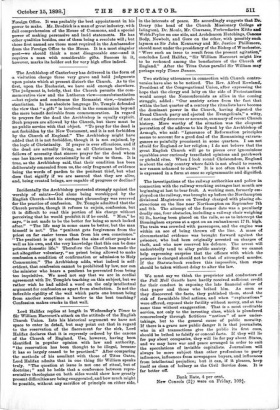The Archbishop of Canterbury has delivered in the form of
a visitation charge three very grave and bold judgments upon points which at present disturb the Church. As to the f rst, upon the Eucharist, we have said enough elsewhere. The judgment is, briefly, that the Church permits the com- memorative view and the Lutheran view—consubstantiation —but rejects and condemns the Romanist view,—transub- stantiation. In less absolute language Dr. Temple defended the view that "a gift" is involved in the communion beyond the mere benefit derivable from commemoration. In regard to prayers for the dead the Archbishop is equally explicit. Such prayers are allowed by the Church, but there must be no public service with that object. "To pray for the dead is not forbidden by the New Testament, and it is not forbidden by the Church of England." The Archbishop might have added that it is not forbidden, though it is not enjoined, by the logic of Christianity. If prayer is ever efficacious, and if the dead are actually living, as all Christians believe, it follows of necessity that sincere prayer for the dead whom one has known must occasionally be of value to them. It is true, as the Archbishop said, that their condition has been deliberately concealed from us, the only fragment of evidence being the words of pardon to the penitent thief, but what does that signify if we are assured that they are alive, and, being created beings, are capable of progress or decline?






































 Previous page
Previous page